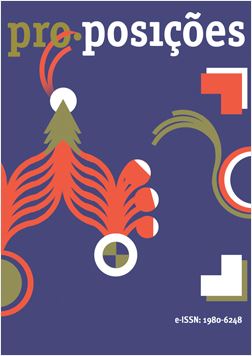Abstract
This article presents the results of a doctoral research that assessed how schools of excellence in the city of Rio de Janeiro manage school research and fight plagiarism. Three groups of actors from four schools were interviewed in a semi-structured way: teachers and specialized professionals who work in the 6th to 9th year of middle school and their students. Students declare that: (i) they plagiarize; (ii) do not present works drafted by them; (iii) they buy works from others; (iv) they make paraphrases without citing sources; (v) they make compendiums of quotations from unread works. Also, schools promote authorship construction and plagiarism is a major concern among all professionals. Thus, teachers should pay greater attention regarding an ethical-pedagogical approach when requesting and conducting school research. The work is based on a theoretical framework that values the dialogue between polyphonic voices in constructing authorship, and in fostering the construction of knowledge through school research.
References
Bakhtin, M. (2010). Para uma filosofia do ato responsável Pedro e João Editores.
Dias, W. T. (2013). Vozes diluídas, camufladas ou exaltadas na fronteira entre a autoria e o plágio [Dissertação de mestrado, Pontifícia Universidade Católica do Rio de Janeiro]. Biblioteca Digital PUC-Rio. https://www2.dbd.puc-rio.br/pergamum/tesesabertas/1111610_2013_pretextual.pdf
Dias, W. T. (2017). Há espaço para a construção autoral [Tese de doutorado, Pontifícia Universidade Católica do Rio de Janeiro]. Biblioteca Digital PUC-Rio. https://www.maxwell.vrac.puc-rio.br/31556/31556.PDF
Dias, W. T., & Eisenberg, Z. W. (2015). Vozes diluídas no plágio: a (des)construção autoral entre alunos de licenciaturas. Pro-Posições, 26(1), 179-197. https://doi.org/10.1590/0103-7307201507602
Fernandes, C. de O., & Freitas, L. C. de. (2007). Indagações sobre currículo: currículo e avaliação Ministério da Educação.
Gatti, B. A. (2020). Perspectivas da formação de professores para o magistério na educação básica: a relação teoria e prática e o lugar das práticas. Revista da FAEEBA – Educação e Contemporaneidade, 29(57), 15-28. https://doi.org/10.21879/faeeba2358-0194.2020.v29.n57.p15-28
Jeffrey, D. (2012a). Le plagiat scolaire : première partie. Formation et Profession, 20(1), 60-63. http://dx.doi.org/10.18162/fp.2012.a10
Jeffrey, D. (2012b). Le plagiat scolaire: seconde partie. Formation et Profession, 20(2), 60-63. http://dx.doi.org/10.18162/fp.2012.a5
Jeffrey, D., & Dias, W. T. (2019). Perceptions du plagiat par de futurs enseignants québécois: dimensions éthiques et pédagogiques. Canadian Journal of Education, 42(3), 767-790.
Luckesi, C. C. (2005). Avaliação da aprendizagem… mais uma vez. Revista ABC EDUCATIO, (46), 28-29.
Marcuschi, L. A. (2001). Da fala para a escrita: atividades de retextualização Cortez.
Marcuschi, L. A. (2008). Produção textual: análise de gêneros e compreensão Parábola Editorial.
Maurel-Indart, H. (2018). Plagiat. Encyclopædia Universalis https://www.universalis.fr/encyclopedie/plagiat
Mottet, M., Morin, É., & Gagné, J.-C. (2013). Faire une recherche d’information: des habiletés essentielles à développer. Formation et Profession, 21(1), 68-70. http://dx.doi.org/10.18162/fp.2013.a15
Ninin, M. O. G. (2008). Pesquisa na escola: que espaço é esse? O do conteúdo ou o do pensamento crítico? Educação em Revista, (48), 17-35.
Oliveira, S. M. M. de, Moreno, N. A., & Cruz, V. A. G. da. (1999). Diagnóstico da pesquisa escolar, no ensino de 5ª a 8ª série do 1º grau, nas escolas de Londrina – Paraná. Informação & Informação, 4(1), 37-50.
Orlandi, E. P. (1995). As formas do silêncio: no movimento dos sentidos Editora da Unicamp.
Park, C. (2003). In other (people’s) words: plagiarism by university students – literature and lessons. Assessment and Evaluation in Higher Education, 28(5), 471-488. http://dx.doi.org/10.1080/02602930301677Park
Peters, M. (2015). Enseigner les stratégies de créacollage numérique pour éviter le plagiat au secondaire. Canadian Journal of Education, 38(3), 1-28.
Torres-Diaz, J. C., Duart, J. M., & Hinojosa-Becerra, M. (2018). Plagiarism, internet and academic success at the university. Journal New Approaches in Educational Research, 7(2), 98-104. https://doi.org/10.7821/naer.2018.7.324

This work is licensed under a Creative Commons Attribution-NonCommercial 4.0 International License.
Copyright (c) 2023 Pro-Posições


